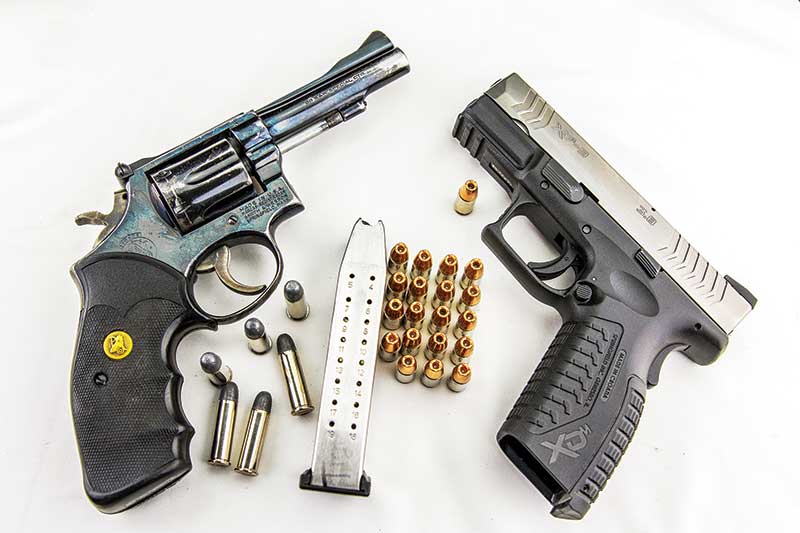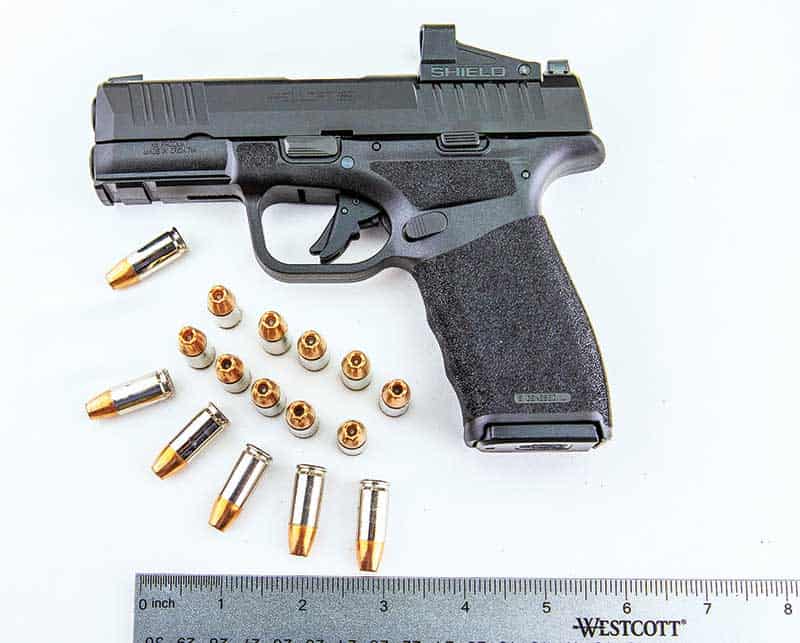Yesterday and today: S&W Model 15 with six .38 Special rounds;
Springfield XD(m) with 20 rounds of 9mm.
I don’t always carry a semiautomatic pistol with a double-stack magazine — but, about two-thirds of the time, I do. Meanwhile, American law enforcement has gone sweepingly to 18-shot 9mm pistols, often with triple spare magazine pouches. In this country, armed citizens have historically modeled their self-defense handguns on what the police carry and, in both cases, the decision is largely driven by what the criminals of the day are doing.
Let’s look at some stats. In 2019, a study published by the Policing Institute determined of 1,180 police officers who had been in shootouts, 126 fired 12 or more rounds to finish their fights — a tad over 10%. Let’s keep this in mind when legislators demand laws that limit a law-abiding citizen’s magazine capacity to 10 rounds plus one in the chamber.
Tom Aveni at the Police Policy Study Council in 1998 referenced a study of Washington, DC Metro officer-involved-shootings from 1994 through 1998 that encompassed nearly 500 shootings. In 126 of those, the officers fired more than the six rounds they would have had in their service revolvers before they adopted GLOCKs, and in 67 the officers fired more than 10 rounds.
Relevance
When people say “Police stuff doesn’t matter, I’m an armed private citizen,” I cringe. We must never forget the police are fighting the exact same criminals the citizens have armed themselves against. A huge number of police shootings evolve from situations where the perpetrator(s) attacked a private citizen to begin with, and this is why the police made contact with them in the first place. In the infamous 1986 Miami shootout, the two heavily armed robber-killers the FBI agents engaged had been shooting innocent citizens to steal their cars and their guns. In the course of the cataclysmic final shootout, FBI men Gordon McNeill and John Hanlon were helpless with empty revolvers when cop-killer Michael Platt crippled them with rifle fire. This incident led the Bureau to adopt auto pistols as standard.
In the famous NYPD shooting on the Grand Concourse, the perpetrator was fleeing from a rip-off when the running gun battle started in which he was still on his feet after being hit with 18 non-expanding .38 Special bullets before a 12-gauge slug dropped him for good. In the famous Skokie, Ill. case where hero cop Tim Gramins stood alone against the ambusher who had just terrorized bank employees during a robbery, it took him 33 rounds of .45 ACP to finally win the fight after 17 solid hits; he was getting toward the end of the last magazine in his GLOCK 21 when he delivered the brain shot that finished the fight against a perp armed with a 16-shot 9mm, a .380 and an SKS rifle. (Tim later switched to a 9mm GLOCK 17 and more spare magazines.)
As we look at the police round-count figures earlier in this column, remember they include many cases of multiple officers firing together. Two cops needing eight rounds apiece to win a gunfight translates to 16 shots needed to achieve the same righteous objective, even for a lone officer or a single armed citizen. And let’s not forget the citizen won’t have body armor, patrol rifle or shotgun and instant radio contact for backup readily at hand.
In Addition to Which …
Today we’re seeing more armed home invasions involving whole gangs of criminals, not just the lone nutcase. We are seeing more bad guys than ever — gang bangers, stalkers, armed robbers — wearing body armor. We are seeing cases of ambushers who know how to use cover and movement tactics. We already had violent criminals “feeling no pain” from alcohol and assorted drugs, and now we have the Fentanyl epidemic to boot. All these things can add up to more shots required to stop bad guys.
When the magazine limit advocates tell you “Well then, just carry spare ammunition to reload with,” your answer might be: “Even if you’re a master shooter who can reload a pistol in two seconds, would you consider it a fair fight if one boxer but not the other was required to lower his hands for at least two seconds in the ring after every 10 punches thrown?”
The five-shot snub-nose .38 has ceased to be the most popular primary line of defense for the armed private citizen. The reasons listed above should give you a good start on explaining why to those who just don’t get it.

